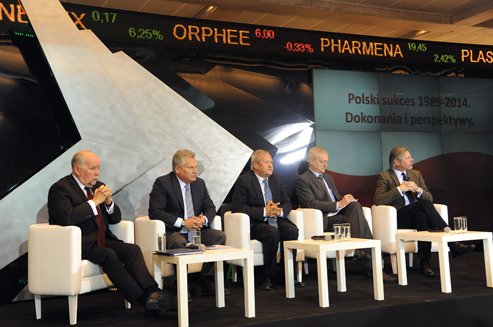The theme of the meeting was naturally set by the following anniversaries: 25 years of our transition to democracy, 15 years of our NATO membership and 10 years of our EU membership. The starting point for the discussion was a research conducted by the Best Place – European Place Marketing Institute on the public opinion about the 25 years of transformation. This research shows that Poles have a problem with self-assessment. And fair evaluation of one’s own achievements is the foundation for defining future challenges and strategies.
– Our debate is needed to demonstrate that we have a lot to boast about and that we can be proud of our achievements. We have to show off Polish successes because our awareness of them is alarmingly poor. All this results from deep-rooted complexes towards the world, mainly the western world – Professor Krzysztof Opolski (Faculty of Economic Sciences, Warsaw University) opened the discussion.
Aleksander Kwaśniewski, President of Poland between 1995 and 2005, stressed that the foundations have been built (political system, origins of modern and open society, market economy).
– Poland’s success is the fact that we went through the transformation in an evolutionary and peaceful manner, through a dialogue, which allowed us to avoid having victims. This proves a high level of maturity of the society. For the sake of strategic goals (safety, joining NATO and EU) we managed to achieve cross-party agreement.
Aleksander Kwaśniewski added that it was the membership in the most powerful political and military alliance in the world that “guaranteed” our safety. Today, considering the situation in Ukraine, the decision made 25 years ago gains even more importance.
– We didn’t achieve this success out of the blue. It was the result of numerous reforms, consequently made by successive governments. In 1989 no one thought we could accomplish what we have today. Although there are still a lot to be done, we have to remember that Poland has become one of few countries in Europe which avoided recession. Today we cannot ignore such dangers as populism and social engineering that is often used in politics. We have to rely on people who think about Poland’s future and not about their own popularity – said Janusz Steinhoff, President of the Polish Chamber of Commerce.
Professor Michał Kleiber, President of the Polish Academy of Sciences, stressed an enormous influence of the transformation period on the development of science and innovation.
– In the last decade the number of students in Poland increased five times. It was a good spurt dictated by the belief in the importance of knowledge in one’s life. Now it’s time for qualitative changes. There is a need to deconstruct young people’s mentality, which has to build a desire to continue education, independent thinking, individual creativity as well as ability to cooperate and not eliminate because of one’s own aspirations – said Professor Michał Kleiber.
The participants unanimously agreed that Poland has very strong foundations to build its future on. Now it’s time for eliminating mistakes, analysing the reforms, catching up, setting up ambitious goals connected with Poland’s role in the world and consistently achieve these goals based on strategic growth management.
– We have plenty of good examples to follow. Let’s not spoil what we can achieve. Today we have to add value to what we have already accomplished. Poland’s potential is huge – summed up Aleksander Kwaśniewski.
More information on: Teraz Polska website.


